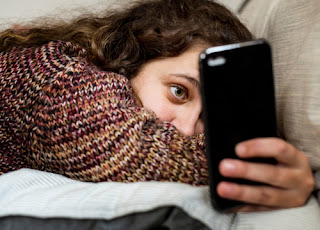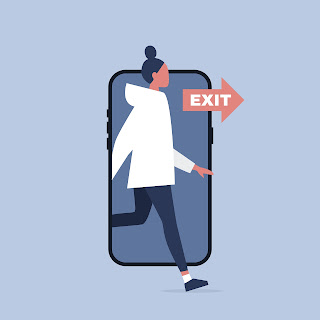by Camila Almeida, CHAMP staff Social media lets you connect with dozens or even hundreds of people. If used correctly, social media can be a great social fitness tool. You can use it to keep up with friends and family and expand your network. You can even use it to learn about countless topics—hopefully from trustworthy sources. You can follow HPRC on Instagram, Facebook, Twitter, and YouTube to stay informed on military health and performance topics too.
Even with the potential benefits of social media, health and wellness experts warn against overusing it. When you’re unable to control screen time, your mental, social, and physical fitness can suffer. I decided to observe and experiment with my social media use to see how it might affect my performance across different areas of Total Force Fitness (TFF). Here’s what I learned.
I was in denial
As a neuroscientist, I’m very familiar with the science on what makes social media so attractive and the consequences of not being able to limit its use. But that doesn’t make me immune to the lure of scrolling through it. After co-writing an HPRC article about social media's impact on performance and mental health, I thought I had a healthy relationship with social media: I silenced my phone during work hours, I didn’t try to multitask while I was driving, and I avoided screens before bedtime.
Still, I started to pay more attention to what made me want to check those social media apps—and how long I spent on them. I soon discovered social media accounted for most of my screen time! And I realized I broke my self-imposed boundaries. I would quickly reach my limit of 30 minutes a day and ignore the notification when I’d reached my maximum time. I just wanted to keep scrolling.
I also noticed I used social media at the end of my work day, while I waited for something or someone, and when I wasn’t actively doing something, such as riding in a car as a passenger. And I noticed I didn’t have a specific goal in mind when I was on social media. I mainly did it out of boredom. I used it like a slot machine, endlessly scrolling until something grabbed my attention. I rarely interacted with people or liked content from friends. I never shared or commented on posts. I would only occasionally reply to comments other people made on my posts.
Many factors can lead to the addictive potential of social media, but in my denial, I thought I was immune. By observing my own behavior, I knew I needed to do something to make my social media use healthier.
I couldn’t just walk away
I decided I needed a clean break from social media. But deciding I wasn’t going to click on the apps wasn’t enough. I would tell myself, “It’s only for 5 minutes.” Then, I’d fall for the endless scrolling trap. So I deleted all the apps from my phone. Not having the apps readily available helped with the initial urge to use social media when cues from the environment—times of the day or specific circumstances—triggered bad habits.
I stayed away from social media for a few months. In the beginning, it was hard not to check social media around my usual times and places. I would unlock the phone, look for the apps, and then remember they weren’t there. With time, the association between my looking at social media at specific places and times of the day got weaker. I eventually stopped looking through my phone.
The gains were real
I turned my attention to the benefits of turning off social media. Two stood out.
- I gave my kids more undivided attention. Often, I’d be on my phone while trying to spend time with my kids. Since I can't multitask, I was distracted and not fully engaged with them. I recall them saying, “Mommy, you’re not paying attention!” With social media out of the picture, my kids started to get my full attention. And they’re totally worth it!
- I was more productive. I had time for all those things I used to say, “I don’t have time for that now.” Clothes that no longer fit were removed from dresser drawers. Folded laundry made it back to the closets faster. And digital photos turned into physical albums. I’m a planner and a doer. I find it satisfying to see a to-do list all crossed out at the end of a day or week. Getting more things done provided more motivation to repair my relationship with social media.
Reinstalling apps tested my self-control
After about 4 months without social media, I decided to reinstall the apps and see how I’d do. Unfortunately, the endless scrolling came back quickly. At one point, I even thought I’d gotten worse and was using social media more. It was frustrating to realize I didn’t have a lot of control over my social media habits, even after an extended break. I didn’t dwell in guilt though.
I know habits are automatic behaviors deeply ingrained in our brains and that following them doesn’t require conscious decision-making. I also know breaking bad habits is hard and that one effective way to avoid those behaviors is to make them harder to do. In my case, deleting the apps was enough to keep me from using social media.
For now, I’ll keep social media apps off my phone. I wasn’t using the apps to strengthen my connections, and I gained real benefits from giving them up. I’d like to feel in control of my social media use. When I’m ready to reinstall them, I’ll use HPRC’s strategies on optimal social media use to help me. But for now, keeping those apps out of sight is the best strategy for me.
For some people, using social media too much goes beyond a lack of self-regulation, it can turn into addictive behavior. In those cases, the uncontrollable urge to use social media affects areas of life that are essential to health and well-being, such as getting enough rest, socializing face-to-face, and getting enough exercise.
If you think you might be addicted to social media, reach out to the Substance Abuse and Mental Health Services Administration (SAMHSA) Helpline for treatment options.
If you have ways that help you control your social media use, I’d love to learn from you! Feel free to leave a comment sharing your strategy.
The opinions and assertions expressed herein are those of the author and do not reflect the official policy or position of USUHS or DoD. The contents of this publication are the sole responsibility of the author and do not necessarily reflect the views, opinions, or policies of The Henry M. Jackson Foundation for the Advancement of Military Medicine, Inc. Mention of trade names, commercial products, or organizations does not imply endorsement by the U.S. Government. The author has no financial interests or relationships to disclose.









